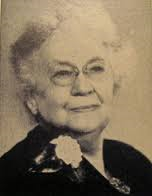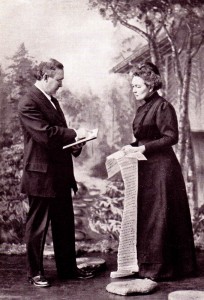We are safer with Him in the dark than without Him in the sunshine.
Lettie B. Cowman, Springs in the Valley
 Millions of people have been comforted by the devotional works of Lettie B. Cowman. Lettie gained deep insights into the consoling mercy of God when she suffered through the loss of her own husband. She was used of God to comfort others.
Millions of people have been comforted by the devotional works of Lettie B. Cowman. Lettie gained deep insights into the consoling mercy of God when she suffered through the loss of her own husband. She was used of God to comfort others.
After her husband Charles’ death Lettie put II Corinthians 1:3, 4 into practice:
Blessed be the God and Father of our Lord Jesus Christ, the Father of mercies and God of all comfort Who comforts us in all our affliction so that we will be able to comfort those who are in any affliction with the comfort with which we ourselves are comforted by God.
Lettie Burd Cowman was born to Isaac and Margaret Burd in Afton, Iowa on March 3, 1870. Lettie’s parents had moved to Iowa as pioneers with their savings sewn up in their garments. Mr. Burd was able to establish himself as a successful banker.
Lettie grew up in a comfortable home. She was exposed to art, literature and music. The youngest of the Burd children, Lettie was lonely after her older siblings left. She filled her world with books, music, and nature. She appreciated the beauty of the creation and always took pleasure in sunsets and blooming flowers. All of these impressions would be reflected later in her writing.
One day Lettie met a young telegrapher named Charles Cowman. Charles had left home to take a job at the Western Union office. Lettie thought he was lonely and invited him to her home. They became more than friends and they pledged their love to each other, but the couple would have to wait to wed until Lettie’s parents would approve. It seemed that they thought that Charles was not right for their daughter.
Isaac and Margaret Burd were glad when Charles got transferred to a distant telegraph office. They hoped that Lettie would marry a successful officer in Isaac Burd’s bank. But Lettie was adamant – she had given her pledge to Charles.
At the age of 21 Charles returned. Now he was a successful telegrapher having risen up in the company ranks to the position of manager. He visited the Burd’s with a promise of reasonable security and bright prospects for Lettie’s future. But it was witnessing the couple together, so much in love and obviously determined to be together that changed Mr. and Mrs. Burds’ hearts. So on June 18, 1889 Lettie and Charles were married in the Methodist Church in Afton, Iowa.
It was at a Missions conference in the Moody Church in Chicago that Charles and Lettie made a dramatic change in their lives. Lettie had been feeling for some time that her life was too frivolous. Now after hearing the speaker, A. B. Simpson (founder of the Christian and Missionary Alliance Church) give a strong appeal for missionaries, Charles and Lettie presented themselves as candidates for the mission field.
At first they wanted to go to India, but Lettie’s health would not allow for it. Instead they trained to go to Japan. Two other men teamed with them who would help in founding the Oriental Missionary Society. (Today it is known as OMS.)
The Cowman’s arrived in Tokyo in 1901. Their first home was just two meager upstairs rooms in a building in downtown Tokyo. This was a far cry from the comfortable home in America, but Charles and Lettie were devoted to giving the Gospel to the Japanese people.
meager upstairs rooms in a building in downtown Tokyo. This was a far cry from the comfortable home in America, but Charles and Lettie were devoted to giving the Gospel to the Japanese people.
In 1912 the Cowman’s began the “Every Creature Crusade” from which the Japanese Church would arise. Between the years of 1912 and 1917 (when the Cowman’s would be forced to return to America) over ten million households in Japan received a copy of the Gospel.
While in Japan the Cowman’s watched the Korean Church being planted, mostly by Americans. They rejoiced in the work of God as through the sweat and the blood of the martyrs the Korean Church would become one of the foremost examples of a modern New Testament Church in the world.
Charles literally burned himself out for the Lord. After sixteen years of daily meetings, overseeing the Bible institute, the “Every Creature Crusade”, and preaching tours in Korea and China, Charles’ health failed. He and Lettie returned to the United States.
Lettie nursed her beloved Charles for six years. She spent her time reading hundreds of books. She read books and poems to Charles to give him the strength to endure his pain. After the long battle Charles succumbed in September of 1924.
Charles’ death was devastating for Lettie. They were childless and Charles meant everything to her. They had had a “marriage made in heaven” and were completely devoted to each other. She wrote in her diary, “This is a living hell on earth!” This is the only entry in her diary that is so downhearted and pessimistic. Lettie had prayed that God would heal Charles. Why didn’t He? What does this mean about how God honors the prayer of faith for the healing of the sick? (See James 5:14,15.) Had not hundreds of people lifted up Charles to God for healing? Where was He?
Lettie turned to the Word for her help. God seemed to be asking her if she wanted her husband to be healed more than she wanted His will for her. Lettie spent hours reading the Bible and scouring the book stores for books on suffering and encouragement. She copied out many truths from books written by others who had trod the path that she had. Little did she know that she was doing this work for others and not just for herself. From the hundreds of words of wisdom that she gleaned the books she read, Streams in the Desert was born.
While doing her research, Lettie came across a piece of paper in her Bible addressed to her. It said, “Go on with the unfinished task.” This was her husband’s passion – the unfinished work. Lettie knew that she must go on with it. But how could she do this alone? Lettie found the help she needed when she turned her worries into praise. I will not follow Satan into gloom, she decided. Lettie’s life became one of continual praise. She wrote two devotional books at this time – After All There is God and Praise Changes Things.
Lettie wrote a biography of her husband, Charles Cowman: Missionary-Warrior. She also wrote Springs in the Valley and a book for young people, Mountain Trailways for Youth, and a book for the elderly, Traveling Toward Sunrise.
And that was not all. This amazing woman assumed the leadership of the Oriental Mission Society (now the One Mission Society) until 1949. She traveled far and wide to speak at conferences. She wrote countless articles for periodicals.
This indefatigable woman even wrote a book at the age of eighty entitled, Life Begins at Eighty. She presented copies of this book to all of her friends at a party that she gave.
Lettie still wanted to continue speaking but her eyesight began to fail. She spent the last years of her life corresponding with countless other hurting people giving them words of wisdom and solace.
Finally, she was ready to go and be with Charles. On Easter Sunday, April 17, 1960 at the age of 90, Lettie rested from her task. In her papers the following poem was found:
Finish thy work, the time is short.
The sun is in the west
The night is coming down,
Till then, think not of rest.
Rest? Finish thy work then rest.
Till then, rest never.
The work of the One Mission Society continues today in over sixty countries around the world.

